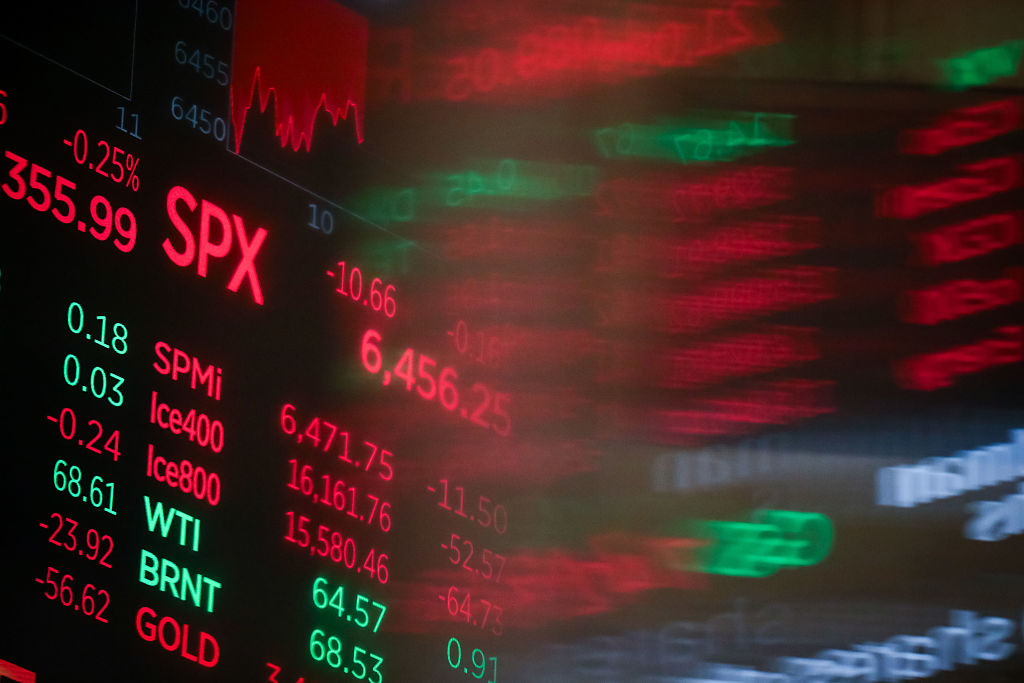6 Value Stock Picks in a Pricey Market
Finding bargains isn't easy these days, but these three value-fund managers dug hard.


Profit and prosper with the best of Kiplinger's advice on investing, taxes, retirement, personal finance and much more. Delivered daily. Enter your email in the box and click Sign Me Up.
You are now subscribed
Your newsletter sign-up was successful
Want to add more newsletters?

Delivered daily
Kiplinger Today
Profit and prosper with the best of Kiplinger's advice on investing, taxes, retirement, personal finance and much more delivered daily. Smart money moves start here.

Sent five days a week
Kiplinger A Step Ahead
Get practical help to make better financial decisions in your everyday life, from spending to savings on top deals.

Delivered daily
Kiplinger Closing Bell
Get today's biggest financial and investing headlines delivered to your inbox every day the U.S. stock market is open.

Sent twice a week
Kiplinger Adviser Intel
Financial pros across the country share best practices and fresh tactics to preserve and grow your wealth.

Delivered weekly
Kiplinger Tax Tips
Trim your federal and state tax bills with practical tax-planning and tax-cutting strategies.

Sent twice a week
Kiplinger Retirement Tips
Your twice-a-week guide to planning and enjoying a financially secure and richly rewarding retirement

Sent bimonthly.
Kiplinger Adviser Angle
Insights for advisers, wealth managers and other financial professionals.

Sent twice a week
Kiplinger Investing Weekly
Your twice-a-week roundup of promising stocks, funds, companies and industries you should consider, ones you should avoid, and why.

Sent weekly for six weeks
Kiplinger Invest for Retirement
Your step-by-step six-part series on how to invest for retirement, from devising a successful strategy to exactly which investments to choose.
Scan the markets today, and it might look as if there’s nowhere compelling to stash your cash. The U.S. stock market trades within striking distance of its all-time high, international stocks look risky, and bond yields remain dismally low. But a good value investor can always unearth a bargain. So, we asked the managers of three top value mutual funds to share their most compelling current ideas.
At T. Rowe Price Value (TRVLX), which has surpassed 95% of large-company value funds over the past five years, manager Mark Finn seeks out unloved companies and sectors. Today, that’s leading him to the financial sector, where he likes biggies JPMorgan Chase (JPM) and Morgan Stanley (MS). Low interest rates and heightened regulatory scrutiny have hurt bank earnings in recent years. And investor sentiment toward bank stocks has never really recovered since the financial crisis.
When it comes to price-earnings ratios, the average large bank trades at a 30% discount to Standard & Poor’s 500-stock index. Finn doesn’t expect earnings to surge back to the heady days before the Great Recession. But he does think investors will love banks a little more once they start to appreciate how much more stable bank earnings are now, compared to pre-crisis times. Morgan Stanley, for example, has significantly expanded its wealth-management unit in recent years (managing assets for clients is a less risky source of earnings than, say, trading with the firm’s own money).
From just $107.88 $24.99 for Kiplinger Personal Finance
Become a smarter, better informed investor. Subscribe from just $107.88 $24.99, plus get up to 4 Special Issues

Sign up for Kiplinger’s Free Newsletters
Profit and prosper with the best of expert advice on investing, taxes, retirement, personal finance and more - straight to your e-mail.
Profit and prosper with the best of expert advice - straight to your e-mail.
Widely anticipated increases in interest rates should help earnings and also boost the price-earnings ratios investors are willing to pay for the stocks. JPMorgan shares trade for 12 times estimated earnings for the next 12 months of $6.23 per share and yield 2.5%. Morgan Stanley stock trades for a P/E of 13 and pays 2.1%.
Value investors are often known for favoring boring businesses over sexy ones, and you can’t get much more boring than meat processing. Tyson Foods (TSN) has long been a commodity meat processor—a business that’s not known for pricing power or profit margins, because one slab of chicken is basically the same as another. But Tyson has been shifting its business toward branded packaged foods—think premium sausages and frozen wings—that garner better shelf space, better pricing and all-around better profit margins. Finn says investors are still treating the stock like a commodity producer, but over time it should be awarded the higher price-earnings ratio of a branded consumer-staples company. The stock trades for 13 times estimated earnings for the next 12 months of $5.07 per share.
Stan Majcher, co-manager of Hotchkis & Wiley Mid-Cap Value A (HWMAX), also has no problem going against the crowd. Majcher, whose fund has beaten 85% of mid-cap value funds over the past five years, currently sees energy as “one of the most interesting parts of the market.” Although the price of oil has rebounded slightly in 2016—reaching about $50 per barrel in late October after falling as low as $26 per barrel in February—it remains depressed compared with its price in recent years. (From 2012 through mid 2014, the price hovered around $90 to $110 per barrel.) He believes the market is in a period of short-term oversupply and that over the next one to three years, market dynamics will shift back to a state of undersupply.
U.S. shale oil producers will be best positioned to profit from that shift, he says, because starting up new shale production is cheaper and faster than most other sources. Majcher’s top pick is Whiting Petroleum (WLL), which is one of the top shale oil producers in the Bakken formation, which stretches from North Dakota and Montana into Canada. The company controls attractive oil-rich areas in the formation, and it boasts a lower cost structure than peers. The stock trades for just 0.5 times Whiting’s book value (assets minus liabilities)—significantly below its average price-to-book-value ratio over the past five years of 1.8 and the S&P’s ratio of 2.7.
Managers at BBH Core Select N (BBTEX), which has bested 97% of funds that invest in large companies with a blend of value and growth characteristics over the past ten years, follow an approach that might earn praise from Warren Buffett. Co-manager Tim Hartch and his colleagues look for resilient companies with durable competitive advantages and smart management teams that trade at discounts. He says Oracle (ORCL) meets all those criteria. The durable competitive advantage comes in part from a sticky base of business customers. That stickiness is a result of both the must-have nature of Oracle’s software and the high costs of switching for businesses—it’s costly and risky for a business to change, say, the database software it uses.
The stock’s performance has been lackluster in recent years, with the shares returning 5.3% annualized in the past five years compared with 13.0% for other software companies. That sluggish performance reflects concerns over Oracle’s ability to navigate the shift to so-called cloud computing, in which customers pay a subscription fee and access software online, rather than paying a licensing fee to download programs. But Hartch says such concerns are overblown. Although the company was initially slow to react to the threat posed by cloud computing, it is now tackling the shift head on with smart acquisitions and additions to its product lineup. Oracle has the flexibility to do so because it throws off so much free cash—about $12 billion to $13 billion per year. The stock trades for 15 times estimated earnings for the next 12 months of $2.68 per share and offers a 1.54% dividend yield.
Like Oracle, Hartch’s other top pick, Discovery Communications (DISCA), is navigating a technological shift. The biggest challenge for the owner of the Discovery and Animal Planet channels is to adapt as cable-TV customers cut the cord. The company’s chief executive officer has touted success in “skinny bundle” deals, in which customers pay a lower cable fee for fewer channels. Discovery also benefits from a large international presence, including the Eurosport network (essentially, the ESPN of Europe). That diversification provides a buffer to its revenues, as other countries lag the U.S. in cord-cutting. The company is also experimenting with offering channels directly to consumers (as, for example, HBO does with its HBO Now subscription product).
But what’s most important, Hartch says, is that Discovery creates excellent content, and, “if you can create very good content, people will pay for it.” Analysts expect earnings to grow at a 16% clip over the next five years. The stock trades for 11 times estimated earnings for the next 12 months of $2.37 per share.
Profit and prosper with the best of Kiplinger's advice on investing, taxes, retirement, personal finance and much more. Delivered daily. Enter your email in the box and click Sign Me Up.

-
 Dow Adds 1,206 Points to Top 50,000: Stock Market Today
Dow Adds 1,206 Points to Top 50,000: Stock Market TodayThe S&P 500 and Nasdaq also had strong finishes to a volatile week, with beaten-down tech stocks outperforming.
-
 Ask the Tax Editor: Federal Income Tax Deductions
Ask the Tax Editor: Federal Income Tax DeductionsAsk the Editor In this week's Ask the Editor Q&A, Joy Taylor answers questions on federal income tax deductions
-
 States With No-Fault Car Insurance Laws (and How No-Fault Car Insurance Works)
States With No-Fault Car Insurance Laws (and How No-Fault Car Insurance Works)A breakdown of the confusing rules around no-fault car insurance in every state where it exists.
-
 If You'd Put $1,000 Into AMD Stock 20 Years Ago, Here's What You'd Have Today
If You'd Put $1,000 Into AMD Stock 20 Years Ago, Here's What You'd Have TodayAdvanced Micro Devices stock is soaring thanks to AI, but as a buy-and-hold bet, it's been a market laggard.
-
 Nasdaq Leads Ahead of Big Tech Earnings: Stock Market Today
Nasdaq Leads Ahead of Big Tech Earnings: Stock Market TodayPresident Donald Trump is making markets move based on personal and political as well as financial and economic priorities.
-
 If You'd Put $1,000 Into UPS Stock 20 Years Ago, Here's What You'd Have Today
If You'd Put $1,000 Into UPS Stock 20 Years Ago, Here's What You'd Have TodayUnited Parcel Service stock has been a massive long-term laggard.
-
 Visa Stamps the Dow's 398-Point Slide: Stock Market Today
Visa Stamps the Dow's 398-Point Slide: Stock Market TodayIt's as clear as ever that President Donald Trump and his administration can't (or won't) keep their hands off financial markets.
-
 Stocks Climb Wall of Worry to Hit New Highs: Stock Market Today
Stocks Climb Wall of Worry to Hit New Highs: Stock Market TodayThe Trump administration's threats to Fed independence and bank profitability did little to stop the bulls on Monday.
-
 Dow Hits a Record High After December Jobs Report: Stock Market Today
Dow Hits a Record High After December Jobs Report: Stock Market TodayThe S&P 500 also closed the week at its highest level on record, thanks to strong gains for Intel and Vistra.
-
 Nasdaq Takes a Hit as the Tech Trade Falters: Stock Market Today
Nasdaq Takes a Hit as the Tech Trade Falters: Stock Market TodayThe Dow Jones Industrial Average outperformed on strength in cyclical stocks.
-
 Dow Hits New High Then Falls 466 Points: Stock Market Today
Dow Hits New High Then Falls 466 Points: Stock Market TodayThe Nasdaq Composite, with a little help from tech's friends, rises to within 300 points of its own new all-time high.